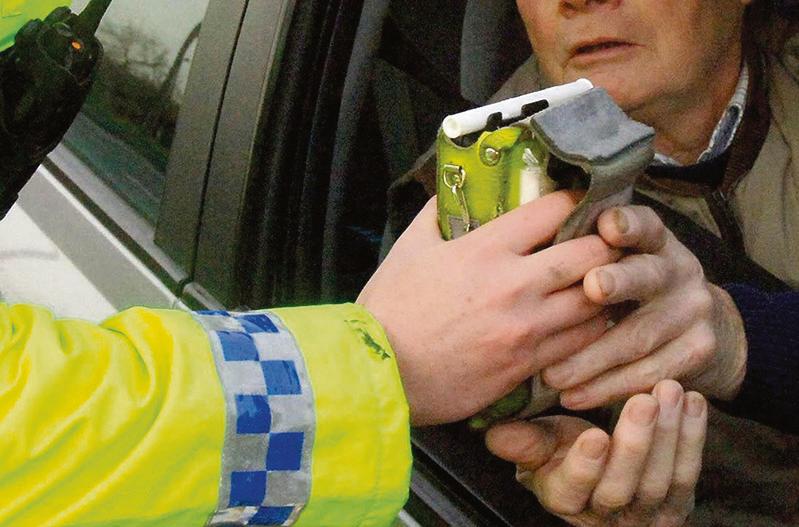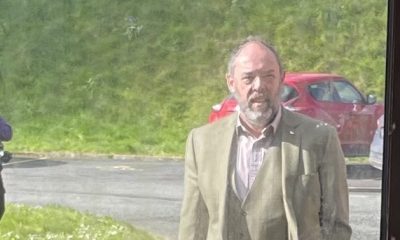News
Bovine TB: The case against culling badgers
 IN RECENT weeks, The Herald has featured in-depth articles on Welsh Government policy towards bovine TB, its eradication and, inevitably, the role of badgers in the transmission and control of the disease.
IN RECENT weeks, The Herald has featured in-depth articles on Welsh Government policy towards bovine TB, its eradication and, inevitably, the role of badgers in the transmission and control of the disease.
On October 21, we reported that Cabinet Secretary for Rural Affairs Lesley Griffiths had announced a ‘consultation’ on proposals for tackling the problem that blights Welsh agriculture both economically and psychologically. The Welsh Government’s proposals for a new regional approach to bovine TB seemed to rule out the sort of badger cull that is taking place in England where, in September, the British Government extended the culling of badgers to seven new areas. The experience of a pilot programme in Northern Ireland was stated as an option to be considered in Wales, however. In that pilot, badgers were trapped in cages and infected animals were killed humanely. The proposed new approach in Wales follows a trial badger vaccination programme.
Global shortage of the vaccine meant that the programme was suspended at the end of 2015. Some critics condemned this as an administrative failure on the part of the Welsh Labour Government because it did not secure sufficient stocks of vaccine before commencing the trails. By contrast, a report by the Animal and Plant Health Agency for the Welsh Government was interpreted by the Badger Trust as heralding the trial’s success. The Badger Trust is a non-profit organisation working for the protection of the European badgers (Meles meles) that are indigenous to Britain.
The Welsh Government’s new approach will see low, intermediate and high TB areas designated across Wales. Designation will be based on the incidence of bovine TB in an area and thence define a specific approach to tackling the disease therein. The consultation encompasses measures to be applied to protect low TB areas and reduce disease in intermediate and high TB areas. In high TB areas, the government will ‘explore and develop ways to break the transmission cycle between cattle and badgers where it can be demonstrated badgers are contributing to the problem in chronic herd breakdowns’.
Lesley Griffiths’ announcement was given a general, if cautious, welcome. Shadow Cabinet Secretary for Energy, Climate Change and Rural Affairs Simon Thomas, Mid and West AM, acknowledged it as ‘a step forward’: “It is welcome that the link between the disease in wildlife and in cattle is being recognised and that measures are being taken to address the policy vacuum that has been in place. It needs to be ensured that the measures taken are targeted, effective and humane. Recognition that a regional approach is needed to tackle the problem is welcome.
“Instances of TB infection in cattle have stayed persistently high in West Wales and is increasing in new areas in Carmarthenshire.”
For the Farmers’ Union of Wales, its President Glyn Thomas concluded that the statement ‘didn’t go as far as we hoped it might and there is a lot of detail to be worked out’. Glyn Thomas sad the FUW would be consulting its members on the proposal.
WHY HASN’T VACCINATION BEEN HAILED A SUCCESS?
In the wake of Lesley Griffiths’ announcement, Sarah Reisz from the Dyfi Badger Group wrote to the Cabinet Secretary. Sarah Reisz expressed ‘concern and disappointment’, viewing the proposals as ‘a very retrograde step’. Commenting on the Test and Vaccinate or Remove (TVR) approach, she identified it as ‘a form of ‘reactive culling’ which aims to be more selective, and involve fewer numbers of badgers killed – and thus avoid perturbation’. The problems with such a policy were many, Sarah Reisz claimed: “Indications are that killing even very few individuals from badger social groups, may well cause perturbation.” Perturbation is a term given to changes in the behaviour of badgers when populations are culled. Research led by Jon Bielby and published in a leading academic journal 2014 found that: “Small-scale culling (such as TVR) changes badgers’ behaviour in ways that risk increasing TB transmission among badgers and exacerbating cattle TB incidence rather than reducing it.”
Acknowledging that Lesley Griffiths voted against badger culling in Wales in 2009, Sarah Reisz claims that the new proposals ‘renege on the Labour Government’s previously stated position that the science does not support culling of badgers in any form as a control measure for bovine TB’. She said: “Reneging on this is unfortunately typical of the kind of politics that has led to voter disenchantment and disengagement.” In her letter, Sarah Reisz asks the Cabinet Secretary how the ‘success’ or ‘failure’ of this policy will be measured. She claims that the incidence of TB in cattle, reported in The Herald as 0.4% for cattle in Wales, has ‘already declined significantly in Wales over the past four years, while vaccination of badgers has been taking place. Why, therefore, isn’t this policy being hailed as a success?’
It flies in the face of virtually all the scientific evidence, Sarah Reitz says, to keep blaming badgers for the spread of bovine TB: “The science shows repeatedly that the problem and the solutions come from cattle management, and that badger culling is a costly and unhelpful distraction. This [announcement] seriously impacts on the good name and kudos that Wales (and the Labour Party) has gained over the past few years by rejecting the discredited policy of culling in favour of vaccination. It has been shown repeatedly that culling a native wildlife species is not, and cannot be, the answer to a problem caused by our own practises, and has always had detrimental consequences for our ecology. It is morally and ecologically wrong.
“Wales has already suffered a particularly catastrophic decline in wildlife species. How can we honestly talk about ‘conservation for our children and grandchildren’ while sanctioning and encouraging a dynamic of wildlife killing?”
OUTSTANDING QUESTIONS
In Northern Ireland, the system of trapping badgers in cages and ‘humanely’ killing infected animals is a so-called TVR approach. The Republic of Ireland has been culling badgers for more than 30 years, reportedly killing over 60,000. The result is that badgers are effectively extinct over around one-third of the land area and badger populations may never recover. The Irish government started a four year vaccination programme in 2014, which will be reviewed in 2017, as they look to phase out culling. Although there has been some reduction in the incidence of bovine TB in the Republic of Ireland, it is impossible to attribute this to a single factor. The number of cattle herds has decreased significantly over the last 30 years, mainly for economic reasons. Meanwhile, similar trends in the declining incidence of bovine TB incidence have been identified in NI, which has not practised badger culling.
For readers who may be wondering why cattle are not vaccinated against TB, it is because, although a vaccine is available, it is currently banned by EU for exported animals or meat. It is possible to obtain an EU ‘derogation’ which would allow the UK to introduce a programme of cattle vaccination against bovine TB without further delay. However, critics claim that Defra have been ‘dragging their feet on this since at least 2011’ and that there is no political will for this course of action, which is opposed by UK farming unions. The Department for Environment, Food and Rural Affairs (Defra) has estimated that there will be no cattle vaccination until at least 2023.
Different approaches may be suitable in different locations. Many have advocated the New Zealand approach, where the main wildlife vector of the disease is the possum. The targeted cull of possums is possible in New Zealand because the animal is non-native and considered a conservation pest.
WHAT HAS CHANGED?
In common with other such groups and the Badger Trust, the Dyfi Badger Group is not against most of the government’s new proposals, which are enhanced cattle measures. Indeed, they contest that cattle measures are what has brought success so far. Groups opposed to badger culling across Wales are expected to work together on all fronts, from promoting the evidence for vaccination to taking direct action against culling. In England, groups have taken direst action with the explicit intention of increasing the cost of policing the cull. The Herald understands that vaccination costs between £400-£500 per badger, while culling is more expensive at between £6,000- £7,000. At the heart of Sarah Reisz’s letter to the Cabinet Secretary is the question: ‘What has changed?’ If vaccination was judged the best option in 2012, what new evidence makes it necessary to change that decision? Critics would claim that the reverse is true, that new evidence indicates even more strongly that no form of culling badgers is effective and that vaccination is more preferable than ever.
So, Lesley Griffiths, what has changed?
News
Man jailed after scarring police officer in Narberth altercation

A 29-YEAR-OLD Narberth man has been jailed after admitting assaulting a police officer causing a deep wound to his forehead and a permanent scar.
“Whilst I realise there are high risks attached to being a serving police officer, I don’t want to come to work fearing for my safety,” Pc Jenkins stated in a victim impact statement read out to District Judge Mark Layton at a court hearing at Haverfordwest Magistrates Court this week.
“This has now left me with a scar on my forehead.”
Officers were called to a flat in High Street, Narberth on the evening of September 8, 2023 as a result of what Crown Prosecutor Abigail Jackson described as ‘an ongoing incident’ between Dilan Anderson and his girlfriend, Lisa Roberts.
“The defendant [Anderson] was shouting at his girlfriend and was told to calm down,” Ms Jackson told the court.
“But he began walking towards the officers in a very aggressive manner. He was asked to move away but he ignored the request.”
Ms Jackson said that following repeated attempts to hold him back, Anderson swung his right arm towards the officers.
“He was placed on the floor with handcuffs, but he turned around and struck Pc Jenkins, resulting in blood coming from the wound.”
Photographs displayed to Judge Layton showed a deep wound to the left of the officer’s right eye.
Following the incident, Anderson was placed on police bail but on January 31 the bail was breached as the result of another altercation between him and his girlfriend at her flat in College Court, Haverfordwest.
“An argument broke out at around 6pm about his excessive drinking, when he became verbally abusive,” said Ms Jackson, for the Crown.
“The defendant went to bed but he woke up at around 1.30am and asked for his girlfriend’s mobile phone.
“When she asked him why he wanted it, he raised his left hand and slapped her to her cheek which caused redness and a constant ringing in her ear.”
Anderson then proceeded to throw two large bottles at her brother’s bedroom door.
“The complainant left the bedroom and the defendant appeared to calm down, but shortly afterwards she heard smashing sounds coming from the living room and then heard the front door being slammed shut,” continued Abigail Jackson. “She later discovered that damage had been caused to the television and a screw driver was found near it and that a blue mobile phone that belonged to her and been taken.”
Anderson admitted ‘stabbing’ the tv with the screwdriver, but claimed the damage this caused was minor.
“This has caused me to be very distressed as I don’t know what he’s playing at,” Ms Roberts said in a victim impact statement that was read to the court.
“He’s very unpredictable and difficult to manage.”
Anderson pleaded guilty to assaulting the police officer causing actual bodily harm, stealing Ms Roberts’ mobile phone, causing criminal damage to her property and assaulting her by beating. He was represented in court by solicitor Mr David Williams.
“My client accepts the precariousness of his position,” he told the court.
Anderson was sentenced to a total of 24 weeks in custody.
He was ordered to pay £500 compensation to Pc Jenkins, £100 compensation to Ms Roberts, £150 as a result of the damage caused to the tv and £40 for the damage caused to the bedroom door.
He was also ordered to pay £170 court costs and a £154 surcharge.
News
Milford motorist pleads guilty to second drink-driving offence in two years

MILFORD motorist John Phillips has been ordered off the roads for three years after admitting his second drink-driving offence in two years.
Phillips, 33, of Ash Grove, Milford Haven was disqualified for 12 months in 2022 after pleading guilty to driving over the legal drink-drive limit.
But this week he found himself back in the dock after once again being stopped by police officers as he drove his vehicle through Tenby town centre after downing several pints with friends.
“Officers saw his Vauxhall Corsa travelling along the Narberth Road in Tenby and it was exceeding the speed limit,” Crown Prosecutor Abigail Jackson told Haverfordwest magistrates court.
“The officers turned their lights on for the vehicle to stop and they saw the defendant was sitting in the driver’s seat smoking a cigarette.”
Phillips told the officers he had drunk ‘a couple of pints’ earlier that evening. A roadside breath test proved positive and Phillips was taken to the police custody suite where two further breath tests were carried out. These gave a lower reading of 50 mcg. The prescribed legal limit is 35.
“He’d had a meal out with friends and it led to him having a number of pints,” his solicitor, Fenn Richards, told District Judge Mark Layton.
“He didn’t think he was over the limit when he left Tenby as he’d drunk a few hours earlier.”
Ms Richards described her client as ‘an ex alcoholic who has also had an issue with drugs’.
Phillips was disqualified from driving for three years. He was fined £120 and ordered to pay £85 court costs and a £64 court surcharge.
Crime
Tenby man admits defecating on floor of mother’s property

A COURT has heard how a Tenby mother feared for her safety after her son threatened to kill her before defecating on the floor outside her bathroom.
Daniel Preston, 37, arrived at Rhian Thomas’ property on the evening of March 26.
“He was heavily intoxicated and told his mother to f* off and called her a c*,” Crown Prosecutor Abigail Jackson told Haverfordwest magistrates this week.
“A few hours later she was in her bedroom and he tried to enter, kicking the door saying “I will f kill you.”
At this point Preston’s mother began fearing for her safety.
“She became scared and called the police, but the defendant then came into her bedroom and tried to grab her,” continued Ms Jackson. “She screamed at him to stop but he tried to grab the phone off her.
“During her phone call to the officers, the police advised her to find a safe place so she went downstairs to the bathroom and locked the door. “
But Preston tried to gain access to the bathroom by repeatedly kicking the door.
“I thought it was going to break,” Rhian Thomas, told the police during her interview.
Ms Jackson said the defendant then proceeded to defecate on the floor outside the bathroom, before smearing the faeces onto the bathroom door.
“This has left me scared,” Ms Thomas said in a victim impact statement that was read out to the court.
“I can’t live like this anymore. When he comes home he takes over everything, and I’m scared that he will blame me and attack me when he’s released [from custody].”
When police officers arrived at the property they discovered Preston slumped on the floor.
“He then became aggressive and abusive and was making threats to harm himself,” said Ms Jackson. “They officers tried to restrain him but he began shouting and reached out with his right hand, attempting to strike one of the officers [Pc Barry] with his open hand which she managed to block.”
Preston pleaded guilty to the common assault of an emergency worker, the common assault of Rhian Thimas and causing criminal damage to his mother’s property by defecating on the floor. He appeared before Haverfordwest magistrates via a video link from Swansea prison where he has been remanded in custody since the offences were committed last month.
“You have caused your mother a great deal of fear,” commented District Judge Mark Layton when imposing sentence.
Preston was sentenced to eight weeks in custody by District Judge Mark Layton, half of which will be served in prison, the remainder on a post-sentence supervision.
A two-year restraining order was imposed preventing him from having any contact with his mother, not entering her property and not going within 100 metres of her address. He was ordered to pay £85 court costs and a £154 surcharge.
-

 Business1 day ago
Business1 day agoBluestone National Park Resort payments expected to end
-

 Community3 days ago
Community3 days agoThe Harbourmaster: Special rail excursion draws crowds to Milford Haven
-

 News2 days ago
News2 days agoDragon LNG ‘monitoring’ scrap car blaze in Waterston
-

 News3 days ago
News3 days agoSearch for Luke, 19, reported missing in the Pembroke Dock area, continuing
-

 News4 days ago
News4 days agoMajor search in the area of The Cleddau Bridge and Hobbs Point
-

 Crime22 hours ago
Crime22 hours agoEstate agents admit health and safety failings following fatal market incident
-

 News6 days ago
News6 days agoNewgale pub fire: Cause undetermined, but ruled accidental
-

 Sport6 days ago
Sport6 days agoJasmine, Lleucu, Carys & Courtney: The Pride of Pembrokeshire






















